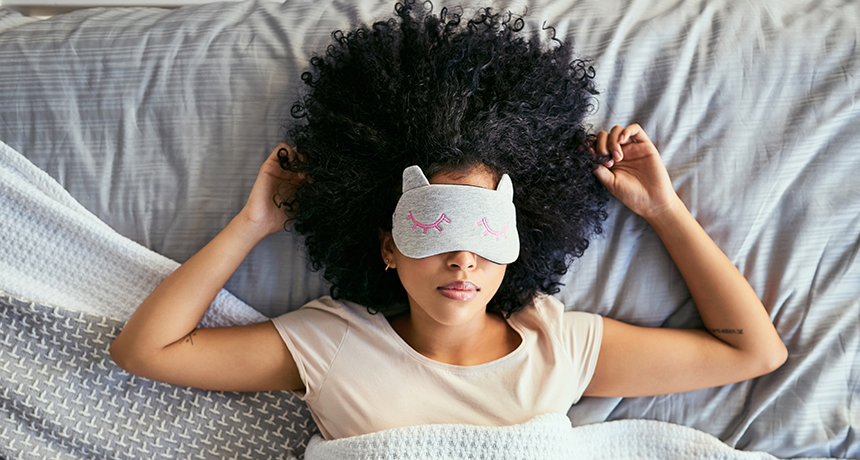Why sleeping in on the weekend won’t work
In a study, people who caught extra Zzz’s on the weekend still suffered health risks

Sleeping late on the weekends may not protect you from the health consequences of sleep deprivation.
LaylaBird/Getty Premium Access
By Jeremy Rehm
Do you use the weekends to catch up on sleep? If so, you may want to rethink that. In young adults, using weekends to catch up for lost weekday sleep can pose health risks. These include late-night munchies, weight gain and lower sensitivity to insulin (the hormone that controls blood sugar).
“The take-home message is basically that you can’t make up for [lost sleep] by sleeping a few more hours on the weekend,” says Paul Shaw, who was not involved in the study. He’s a neuroscientist at Washington University in St. Louis, Mo. “It’s not as simple as saying, ‘Oh, if I sleep in on the weekends, I’ll be better,’” he says.
Since the 1990s, scientists have understood that missing sleep can harm someone’s health. The changes it causes can lead to obesity and type 2 diabetes. Yet in 2014, a little more than one in every three U.S. adults reported sleeping fewer than the recommended seven hours a night. That’s according to the U.S. Centers for Disease Control and Prevention.
Weekends may seem like a great time to catch up on sleep. Scientists, however, weren’t sure that would work. So Christopher Depner and his colleagues decided to test it out. Depner is a sleep physiologist. He works at the University of Colorado, Boulder.
The team looked at three groups of people in their mid-20s. For roughly two weeks, each group followed a set sleep schedule. One group slept about eight hours every night. Another group only got about five hours of shuteye a night. The third group snoozed some five hours each weeknight, but could sleep whenever and however much they wanted over the weekend.
That last group stayed up until midnight or 1 a.m. on Friday and Saturday nights. The following mornings, they slept in until sometime between 11 a.m. and noon. But they also stayed up late on Sunday. That left them only about six hours of snooze time before the next workweek started. Over the whole weekend, these people got only about 1.1 hours more sleep than what their bodies needed, the researchers found.
“So they did get extra sleep,” Depner notes. But it wasn’t enough to make up for sleep they lost during the week. That what he and his team reported February 28 in Current Biology.
Downsides to too-little or delayed shuteye
People in the study who got too little sleep every night gained weight. So did the weekend sleep-in crowd. By the end of the experiment, people in both groups had gained an average of 1.5 kilograms (3.3 pounds).
Depner says this could be because losing sleep interferes with hormones that control hunger, such as leptin. Since weekend-catch-up sleepers both woke up later and went to bed later, they shifted their body’s internal clocks. As a result, they may have gotten hungry later. During the work weeks, both groups ate roughly 400 to 650 calories in late-night snacks. (Those included foods such as pretzels, yogurt and potato chips.)
But the two groups were different when it came to insulin sensitivity. (If a person is highly sensitive to this hormone, it tells doctors that this person’s metabolism — use of calories — is healthy.) The researchers looked at how all the tissues in the body responded to insulin. Their sensitivity to the hormone fell some 27 percent over the study. That was worse than what was seen in people who slept five hours every night. Their insulin sensitivity dropped only half as much.
After a weekend of playing catch up on sleep, those who had slept too little on weeknights showed significant drops in insulin sensitivity in their liver and muscle cells. Both tissues play an important role in digesting food. Neither of the other two groups responded this way.
“That was very unexpected,” Depner says. Cycling between sleepless weeks and recovery weekends could, all by itself, “have some negative health consequences,” he now suspects.
Peter Liu questions how much these results apply in the real world, especially in people who consistently get little sleep. He is an endocrinologist — a doctor who studies hormones — at the University of California, Los Angeles. In his own research, he’s studied people who report getting too little sleep. Yet he found that a few extra hours of sleep improved their insulin sensitivity. So the latest study, he cautions, “is not the final word on this important topic.”
It seems that resting is “the third pillar of a healthy lifestyle: sleep, exercise and diet,” Liu says. “You wouldn’t say to someone, ‘You need to be on a good diet from Monday to Friday, but on the weekend you can eat whatever you like,’” he notes. “I think it’s the same principle here with sleep.”







